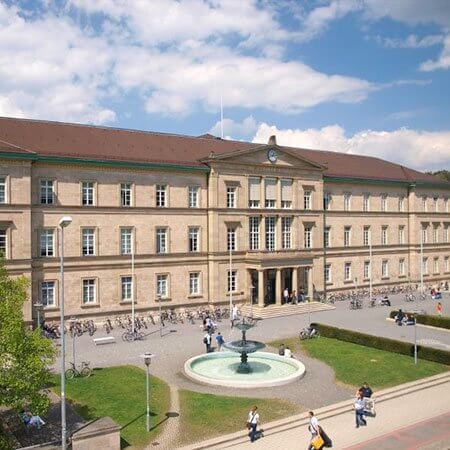Endometrial Cancer (uterine Cancer) — Total Resection of the Uterus and Omentum: treatment in the Best Hospitals of Germany
Treatment prices are regulated by national law of the corresponding countries, but can also include additional hospital coefficients. In order to receive the individual cost calculation, please send us the request and medical records.

Department of Gynecology, Mammology and Obstetrics
The Department of Gynecology, Mammology and Obstetrics offers the full range of services in these fields, providing patients with the optimal treatment based on the very latest scientific advances and innovative technologies. The department's tasks include diagnostics and treatment of all gynecologic diseases and breast pathologies, as well as pregnancy management, childbirth and postnatal care for both mother and baby, elimination of fertility problems in women. The department has modern equipment for invasive and non-invasive diagnostics, three operating rooms equipped with state-of-the-art technology, especially in the field of minimally invasive and robot-assisted surgery, as well as special devices for microsurgery and fetal surgery. A competent medical team consisting of 18 senior physicians, 25 assistant physicians and medical specialists, obstetricians and specially trained nursing staff annually admits approximately 5,000 women for inpatient treatment and provides outpatient medical care for 14,000 patients. In addition, the department has four maternity rooms, in which about 2,000 babies are born annually.







Department of Gynecology, Mammology and Obstetrics
The Department of Gynecology, Mammology and Obstetrics offers the full service range in these fields. The department specializes in the treatment of benign and malignant diseases of the female reproductive organs, breast, as well as comprehensive pregnancy management, childbirth and postpartum care. A treatment regimen is developed for each patient individually. Most surgical interventions can be performed using sparing surgical techniques. The department is certified by the German Cancer Society as the Center for Gynecologic Oncology, which indicates strict adherence to national treatment protocols and high quality of treatment.






Department of Adult and Pediatric Gynecology, Mammology, Obstetrics
According to the Focus magazine, the Department of Adult and Pediatric Gynecology, Mammology, Obstetrics is included in the ranking of the top German departments specializing in obstetrics and breast cancer treatment! The department offers the full range of diagnostics and treatment of diseases of the female reproductive system, breast pathologies. Also, the specialists of the department provide a comprehensive management of pregnancy, childbirth and postpartum care for both mother and child. Key attention is paid to the treatment of female genital cancers, as well as breast cancer treatment. For this purpose, the department has all the modern therapeutic techniques, as well as its our own innovative developments by the department doctors.






Endometrial cancer is the most common gynecologic oncology in developed countries. The disease develops mainly in old age. The standard operation for its treatment is a total resection of the uterus and omentum. In Germany, a hysterectomy is performed by experienced specialists with a minimal risk of complications. Doctors perform not only classical abdominal operations but also minimally invasive laparoscopic and robot-assisted interventions. They are safer, less traumatic, and can reduce the period of cancer rehabilitation.
Content
Doctors usually remove the uterus with the fallopian tubes, ovaries, lymph nodes, and omentum. Surgeons in Germany perform not only open, but also laparoscopic surgery. Surgical treatment is followed by chemotherapy and radiation therapy.
You can seek medical attention from the University Hospital Rechts der Isar Munich, the Helios Hospital Berlin-Buch, or the University Hospital Tuebingen.
You do not have to take care of the arrangements for your trip yourself. The specialists from the Booking Health company will solve all organizational issues for you, from choosing a hospital and a doctor to translating the received recommendations into your native language. Booking Health will take care of a quick treatment appointment, applying for a visa and travel to the clinic, interpreting services, monitoring invoices from the clinic, etc.
What is a hysterectomy?
A hysterectomy is a surgical procedure to remove the uterus. It can be performed using different techniques and to different extents.
Surgery for endometrial cancer is usually performed through an abdominal incision. Occasionally, the operation can be performed through the vagina. Although this intervention is less traumatic, it is less likely to cure cancer. Doctors therefore perform a vaginal hysterectomy only in women who cannot tolerate an abdominal hysterectomy.
In the case of endometrial cancer, doctors remove not only the uterus but also other organs, namely:
- both ovaries and fallopian tubes;
- pelvic and aortic lymph nodes;
- omentum.
The ovaries are always removed. The exception is in cases when the operation is performed on a woman under 45 years of age. The preservation of the ovaries then avoids premature menopause. They can be preserved only if there is no harm to the oncological treatment outcome. More accurate monitoring will be required after such an operation since the risk of a tumor recurrence increases.
Lymph nodes are always removed as well. This is required to assess the stage of the disease and reduce the risk of a recurrence. They can only be removed through an abdominal, but not vaginal, approach.
Women often undergo an omentectomy, which is a surgical procedure to remove the omentum. This is a layer of adipose tissue that covers the organs of the abdominal cavity. It is removed to check for cancer or if the tumor has spread to this area.
Lymph node surgery
When performing surgery, doctors usually remove the lymph nodes. This stage of the intervention is called a lymph node dissection. Subsequently, these nodes are examined to see if they contain any cancer cells. This affects the treatment regimen after surgery.
If you are undergoing your treatment in Germany, there is a chance to avoid this stage of the operation. In developed countries, sentinel lymph node mapping is increasingly being performed. This procedure can be carried out at an early stage of the disease. A dye and a radionuclide are injected into the area near the cervix. Doctors then check which lymph nodes these substances accumulate in. The dye is visible to the naked eye, and a gamma camera is used to determine the accumulation site of the radiopharmaceutical.
The lymph nodes in which the injected substances have accumulated are called signal nodes. They are the first to collect lymph from a tumor. Doctors remove and examine them. If there are no cancer cells, this means that they are also absent in other lymph nodes. A lymph node dissection is therefore not required. If it is not performed, the operation becomes less traumatic and safer. A patient can thus avoid complications caused by impaired lymph outflow from the pelvic and abdominal cavity.
Minimally invasive treatment
In Germany, laparoscopic and robot-assisted interventions are increasingly being performed instead of conventional operations through a large abdominal incision. The uterus and lymph nodes are removed through several small incisions with thin and long instruments. These are standard operations in gynecology, but specialists with vast experience are required to successfully perform laparoscopy for cancer. Doctors at German specialized centers successfully perform such interventions.
After surgery to remove the uterus, doctors often prescribe chemotherapy, sometimes combined with radiation therapy. This is necessary to reduce the risk of cancer recurrence. Chemotherapy is usually used starting from the 2nd stage of the disease, but in aggressive types of tumors, it can be prescribed even at the 1st stage.
You can seek medical attention from one of the German hospitals to undergo your diagnostics and surgical treatment of endometrial cancer. You can find the cost of procedures and operations on the Booking Health website and compare prices to make your treatment at the best price. Our employees will select the most suitable clinics in Germany and arrange your trip.
Authors:
The article was edited by medical experts, board-certified doctors Dr. Nadezhda Ivanisova and Dr. Vadim Zhiliuk. For the treatment of the conditions referred to in the article, you must consult a doctor; the information in the article is not intended for self-medication!
Sources:

